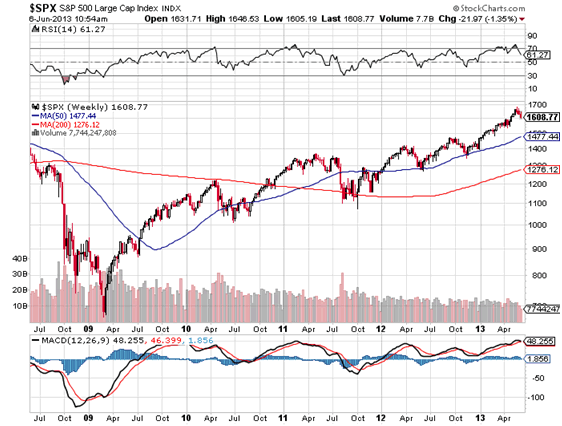Who Really Benefits from Inflation and Why You’re Not Wealthier
Stock-Markets / Financial Markets 2013 Jun 10, 2013 - 03:46 PM GMT Sasha Cekerevac writes: The Federal Reserve Bank of St. Louis released an interesting report analyzing the underlying fundamentals of why America’s economic growth level still remains quite anemic. The results won’t surprise many people—most American households have rebuilt only a fraction of the wealth lost during the recent recession.
Sasha Cekerevac writes: The Federal Reserve Bank of St. Louis released an interesting report analyzing the underlying fundamentals of why America’s economic growth level still remains quite anemic. The results won’t surprise many people—most American households have rebuilt only a fraction of the wealth lost during the recent recession.
According to the Federal Reserve Bank of St. Louis, household net worth peaked at $67.4 trillion during the fourth quarter of 2007. Household net worth then sunk to a low of $51.4 trillion in 2009, and has since rebounded to $66.1 trillion. (Source: “Annual Report 2012,” Federal Reserve Bank of St. Louis web site, May 2013, accessed June 6, 2013.)
While it appears that nominal net worth has recovered 91% of the losses, the St. Louis Federal Reserve notes that this is not an accurate representation of either household wealth or economic growth.
Since inflation was present during this time—for a total of two percent per year over the last five years—and the number of households increased by 3.8 million, the real recovery rate is only 45% of household wealth, according to the St. Louis Federal Reserve.
Why is economic growth still lagging, and why don’t most Americans feel wealthier? As the St. Louis Federal Reserve reports, the vast majority of the gains have been in the stock market. Because the stock market is primarily an investment for a relatively small number of Americans, this leads to significant differences in wealth creation.
Increasing or decreasing wealth is just as important as income for economic growth. Because a large percentage of the population has not had an increase in total wealth or has not seen improvements in their balance sheets, economic growth remains stagnant as there is continued uncertainty throughout the economy.
As I’ve stated in these pages many times before, one needs to have a well-diversified portfolio. An example of a mistake made by those who have not participated in the recent wealth creation is the high percentage of residential real estate that is making up many investors’ portfolios.
According to the report by the Federal Reserve Bank of St. Louis, young, uneducated families have approximately 70% of their portfolio in residential real estate, as compared to 30% for older college-educated families.
This helps explain, at least partially, why wealth is not spreading evenly among all Americans. Most investors’ portfolios are simply not diversified enough and are not exposed to the stock market, among other assets.
Below is the chart for the S&P 500 Index:

Chart courtesy of www.StockCharts.com
This lack of wealth creation across all demographics is leading to uncertainty for many Americans, creating a drag on economic growth. While the Federal Reserve has done essentially what it can to help restore wealth, because only a small percentage of the population benefits from these efforts, it leads to an uneven injection of stimulus for economic growth nationwide. In other words: some of the population benefits, while many others do not.
While the stock market did crash significantly, bottoming in 2009, long-term investors with a diversified portfolio took this opportunity to hold and even continue buying stocks when they were cheap. Since older and educated investors have only a small percentage of their portfolio in their residential real estate, this diversification has allowed them to participate in the wealth creation that has occurred over the past few years.
The real message for the long-term investor is not to focus all your energy and attention on the current level of economic growth or even what the Federal Reserve is doing, but instead, ensure you have a well-diversified portfolio and a variety of different assets. Picking the best assets in a variety of sectors can help increase the probability of long-term wealth generation.
Source:http://www.investmentcontrarians.com/rec...
By Sasha Cekerevac, BA
www.investmentcontrarians.com
Investment Contrarians is our daily financial e-letter dedicated to helping investors make money by going against the “herd mentality.”
About Author: Sasha Cekerevac, BA Economics with Finance specialization, is a Senior Editor at Lombardi Financial. He worked for CIBC World Markets for several years before moving to a top hedge fund, with assets under management of over $1.0 billion. He has comprehensive knowledge of institutional money flow; how the big funds analyze and execute their trades in the market. With a thorough understanding of both fundamental and technical subjects, Sasha offers a roadmap into how the markets really function and what to look for as an investor. His newsletters provide an experienced perspective on what the big funds are planning and how you can profit from it. He is the editor of several of Lombardi’s popular financial newsletters, including Payload Stocks and Pump & Dump Alert. See Sasha Cekerevac Article Archives
Copyright © 2013 Investment Contrarians - All Rights Reserved Disclaimer: The above is a matter of opinion provided for general information purposes only and is not intended as investment advice. Information and analysis above are derived from sources and utilising methods believed to be reliable, but we cannot accept responsibility for any losses you may incur as a result of this analysis. Individuals should consult with their personal financial advisors.
Investment Contrarians Archive |
© 2005-2022 http://www.MarketOracle.co.uk - The Market Oracle is a FREE Daily Financial Markets Analysis & Forecasting online publication.



